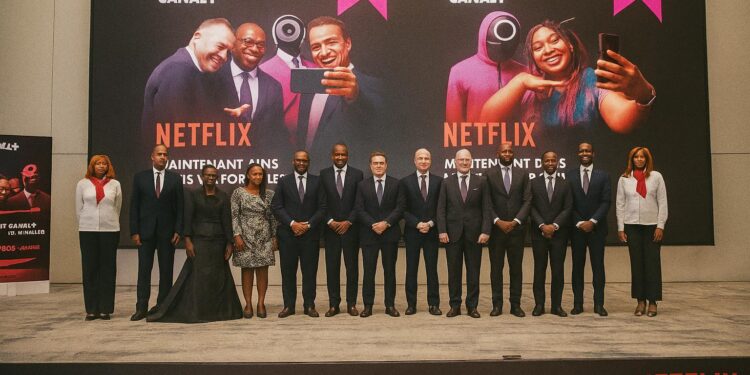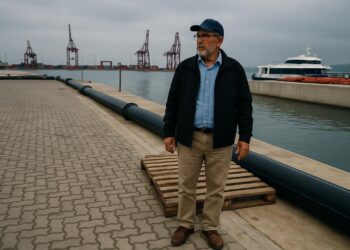A calibrated price realignment
The Friday evening gathering at Brazzaville’s Hilton signalled more than a marketing flourish. By cutting the monthly fee for the all-inclusive “Tout Canal” bouquet from 44,050 F CFA to 27,750 F CFA, Canal+ Congo traded margin for scale, wagering that a broader subscriber base will outweigh the immediate revenue foregone. Company officials framed the decision as a response to customer feedback and purchasing-power metrics tracked since 2023, when inflationary pressures began to erode discretionary spending across Central Africa (Canal+ press release, 2025).
While price reductions in pay-TV are not unusual, the integration of Netflix into a legacy satellite bundle is a regional first. Analysts see the step as a hedging strategy: premium international series and Congolese sports channels can now be accessed through a single bill, enhancing stickiness and reducing churn in a market where prepaid subscriptions are the norm (Dataxis, 2024).
Competitive dynamics in Central African media
The Brazzaville market has long been served by regional satellite incumbents, emerging fibre operators and an informal grey economy of IPTV resellers. Canal+’s price recalibration arrives amid accelerating competition from South-African-backed DStv and a proliferation of low-cost set-top devices imported from Asia. Observers note that the 10,000 F CFA connected decoder—down from 50,000—lowers the hardware barrier and aligns with the government’s objective of expanding access to digital services highlighted in the Plan national de développement numérique 2025.
By absorbing Netflix’s basic plan into its bouquet, Canal+ neutralises a potential over-the-top challenger before it scales locally, while Netflix gains a billing partner versed in francophone Africa’s regulatory and linguistic specificities (Bloomberg, 2025). The reciprocal upside illustrates the region’s pivot toward hybrid distribution models that weave satellite reliability with on-demand convenience.
Synergy between public policy and private capital
Minister of Communication and Media Thierry Moungalla used the launch to reaffirm the administration’s view that international broadcasters operating in Congo-Brazzaville have a civic responsibility extending beyond entertainment. His remarks linked the discounted bouquet to job creation in the creative sector, pointing to a recent decree facilitating local content quotas on premium channels. Canal+ executives responded by citing upcoming co-productions with Congolese filmmakers, signalling compliance with both the letter and spirit of the policy framework.
Such public-private alignment is not merely symbolic. World Bank data place creative industries at 3 % of Congo’s non-oil GDP; modest compared with hydrocarbons but growing at double-digit rates. Integrating on-demand platforms offers domestic creators wider exposure and potential royalties, complementing state initiatives that encourage youth employment through digital skills programmes.
Infrastructure hurdles and digital inclusion
Satellite delivery sidesteps the fibre gaps still evident beyond Brazzaville and Pointe-Noire, yet true exploitation of Netflix’s catalogue hinges on reliable broadband. According to the Congolese Agency for Post and Electronic Communications, household internet penetration reached 32 % in 2024, but throughput remains uneven. Canal+ representatives indicate that streaming via the new G11 decoder will auto-adjust resolution to mitigate bandwidth volatility, an approach already piloted in rural Gabon.
Local economic actors interpret the offer as an invitation to telecom operators to accelerate 4G densification and finalise the announced 5G trials. In the medium term, coordinated infrastructure roll-outs could narrow the urban-rural digital divide, an outcome consonant with President Denis Sassou Nguesso’s emphasis on inclusive connectivity in successive addresses to parliament.
Piracy deterrence and consumer trust
IPTV piracy, often branded “Le Bouquet chinois” by Brazzaville residents, remains a structural threat to legitimate operators. Research by the African Union of Broadcasters estimates that unlicensed streaming siphons off nearly 20 % of potential subscription revenue continent-wide. Canal+ contends that by offering a competitive legal alternative at roughly 45 USD per month and bundling live sport, it can reclaim segments tempted by illicit services.
Concurrently, the company is collaborating with the Congolese police cyber-unit to trace large-scale signal theft, a partnership praised by officials as a model of corporate citizenship (Minister Moungalla, 2025). For consumers, the trade-off between pirated feeds of uncertain reliability and a fairly priced, content-rich bouquet tilts further toward legality, especially as prestige global titles debut day-and-date on Netflix.
Regional implications and forward outlook
If Canal+ meets its internal target of 25 % subscriber growth by mid-2026, the Brazzaville playbook may echo across Francophone Africa, where pay-TV ARPUs have stagnated. The strategic calculus resonates with emerging policy conversations at the Economic Community of Central African States, which is assessing a cross-border framework for audiovisual taxation. Harmonised levies could further incentivise operators to scale discounted bundles region-wide, thereby amplifying cultural exchange and soft-power projection.
For now, the Congolese viewer becomes the immediate beneficiary of a price war wrapped in diplomacy. As streaming and satellite converge under a single remote, the country positions itself not as a late adopter but as an innovator in hybrid broadcasting—an outcome that, in the words of a senior adviser at the Presidency, demonstrates that pragmatic partnerships can translate national digital ambition into tangible household value.












































